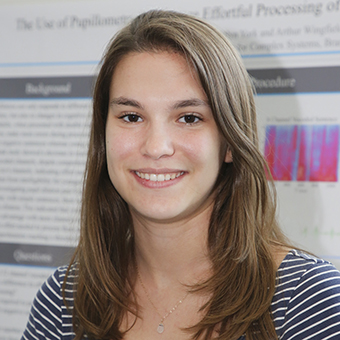Kaitlyn York
 Wingfield Laboratory
Wingfield Laboratory
Department of Psychology
Brandeis University
The Use of Pupillometry to Examine Effort While Processing Noise Vocoded Complex Sentences
Poster Abstract
The pupil size of the human eye responds to differing light conditions and also increases in constant light with cognitive or attentional effort (Kahneman & Beatty, 1966). Noise vocoded speech has been used to simulate the experience of hearing speech transduced by a cochlear implant with different degrees of spectral resolution. This study examines the comprehension of sentences that vary syntactic complexity, plausibility, and number of spectral channels. While listening to these sentences that contain double or single negatives, young and older adults with normal hearing acuity are asked to recall the sentence. Pupil size is measured throughout, to determine if (despite similar levels of comprehension) pupil size shows relatively less dilation in response to sentences with higher spectral resolutions, indicating a reduction in effort needed to process those sentences. Successful results within this study would encourage an analogous study involving people with cochlear implants.
Personal Statement
I joined the Wingfield Memory and Cognition Lab as researchers in the lab are interested in looking at cognitive changes throughout aging. Once I settled into the lab and had a better understanding of the scientists’ research, I was captivated by the prospect of looking at cognitive effort through online measures such as pupillometry. In the past, most of my time at the Wingfield Lab has been spent collaborating on a project looking at the benefits of speech prosody for older adults. As an M.R. Bauer Fellow this summer, my time was spent establishing my current project that will become my senior thesis. Throughout its development, I have learned how to normalize sentences, use a program to manipulate them to sound like speech through a cochlear implant and write a program to run the experiment. This opportunity has allowed me to learn about the large amount of preparation that goes into creating an experiment. It has also given me the chance to develop skills such as creating a computer program for neuropsychological experiments, along with collaborating with others and learning from their experiences. Furthermore, working in the Wingfield Lab has taught me the benefits of looking into every aspect of an experiment, especially potential confounding variables and analyzing every step along the way. Personally, the summer experience has shown me that I enjoy research and creating experiments, and that I want to this in the future. I thank the Bauer Foundation for making my summer of research possible.